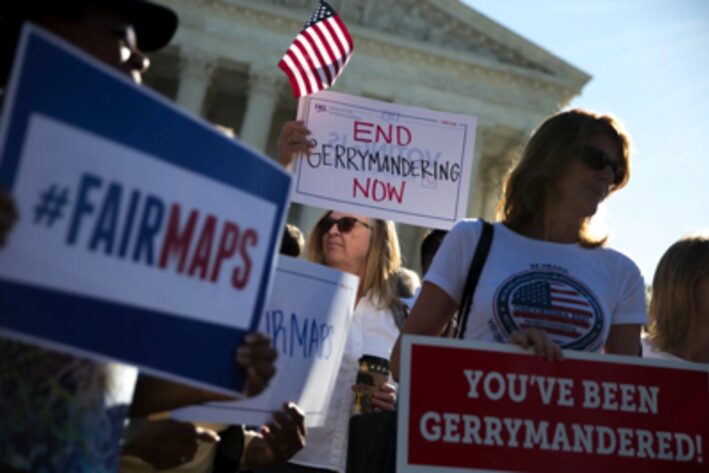Partisan Gerrymandering: All or None 

(Source)
Each election in the 21st century has enormous political consequences. But because of America’s increased polarization, partisan gerrymandering—the drawing of political boundaries to favor one party over the other—proliferates elections now more than ever. Given the current political climate, the solution to achieve fairness in congressional redistricting is either for both parties to lean into gerrymandering or for Congress to introduce new legislation to curb the practice entirely.
Partisan gerrymandering takes several forms, most notably cracking and packing. Cracking a district means splitting up a solid group of voters for the opposing party and distributing those voters across several adjacent districts, so the formerly solid district becomes competitive. On the other hand, packing is used to cram as many voters as possible from the opposing party into one district. While the other party will likely win one seat, their power will be weakened in other districts. The controlling party’s goal is to insulate themselves and gain additional seats by subordinating voters from the opposing party.
The Supreme Court has addressed partisan gerrymandering on multiple occasions. Most recently in 2019, the Court in Rucho v. Common Cause held that partisan gerrymandering, unlike racial gerrymandering, is a “non-justiciable political question.” The Supreme Court refused to address gerrymandering, asserting that Congress, and not the Court, has the authority to enact a regulatory scheme addressing gerrymandering at the federal level. However, no such bill has been passed yet.
Because Congress has not enacted an overarching regulatory scheme, who draws the political maps differs vastly on a state-by-state basis. In most states, state legislatures play the dominant role in congressional and legislative redistricting. A minority of states employ redistricting commissions or a hybrid system in which the legislature shares redistricting authority with a commission. Each state must revise its congressional maps no less than once every decade following the completion of the United States Census, and typically the states’ governor or highest court has the authority to veto proposed maps. The outcome of these maps has great influence on the geopolitical landscape for the following decade. Republicans were the principal beneficiaries of partisan gerrymanders after the 2010 census, when extreme partisan bias in congressional maps gave Republicans a net 16 to 17 seat advantage in the House of Representatives.
Additionally, Republican-governed states are more likely to approve maps with gerrymanders than Democrat-governed states. Following the 2020 census, commissions disproportionately existed in more states where Democrats enjoyed full control of state government. Democrats were therefore limited from drawing maximalist gerrymanders in several states, including California, Colorado, Virginia and Washington. Instead, commissions drew relatively fair maps in these states. Further, courts in New York and Maryland struck down proposed maps, causing Democrats to lose their main redistricting advantage prior to the 2022 midterm election. On the other side, Republicans saw the approval of an extremely biased map in Florida, created by Governor Ron DeSantis and upheld by Florida courts, which singlehandedly added four new Republicans to the House of Representatives.
Partisan gerrymandering clearly harms our democracy: it suppresses voters, reduces electoral responsiveness, and tarnishes the democratic process in the eyes of voters. Politicians, judges, and members of the voting public spanning the entire political spectrum have all condemned partisan gerrymandering. House Speaker Nancy Pelosi called the practice “unjust and deeply dangerous” and Republican Judge Paul V. Niemeyer called the issue “cancerous,” writing that partisan gerrymandering is “undermining the fundamental tenets of our form of democracy.” And according to a 2017 national bipartisan survey commissioned by the Campaign Legal Center, 73% of voters would support removing partisanship from redistricting efforts, even if it meant their preferred political party would win fewer seats.
Because the Supreme Court failed to curb partisan gerrymandering in Rucho, the best remaining (and most widely advocated) course of action is for Congress to pass anti-gerrymandering legislation. As argued by House Representative Alan Lowenthal, most liberal democracies in the world have already moved past political redistricting to some form of commission, as independent commissions are currently the best tool that voters have to mitigate political influence and the negative effects of gerrymandering. The true solution would be federal legislation requiring every state to use a nonpartisan, independent commission. To that effect, House Democrats have attempted to resolve the issue by introducing the For the People Act—and later the Freedom to Vote Act—to expand voting rights, but both were blocked in the Senate. The Freedom to Vote Act would have required nine congressional maps used in the 2022 midterm election to be changed, including five drawn by Republicans, three by Democrats, and one by a political appointee commission.
Because the Republican party has reaped the benefits of partisan gerrymandering for most of the 21st century, there currently exists no incentive for Republican politicians to support an anti-gerrymandering bill. Given the Supreme Court’s unwillingness to get involved and Congress’ inability to pass legislation, short of the highly unlikely passage of a constitutional amendment, the most viable approach to achieve these policy ends is for Democrats to gerrymander to the same extent Republicans have for a decade. There currently exists unilateral disarmament from Democrats in states where Democrats have full control of the state government, but Republicans continue to gerrymander successfully in states where they have control over the redistricting process. Because the incentive to eliminate partisan gerrymandering currently exists solely on the left side of the aisle, only once the map is neutral (or left-leaning) at the national level will any anti-partisan gerrymandering legislation pass. Once partisan gerrymandering begins to produce setbacks for Republicans as it has for Democrats, an incentive will exist on both sides of the aisle to curb the practice entirely.
Encouraging both parties to partake in partisan gerrymandering is not a permanent solution. As Judge Niemeyer aptly stated, “both Democrats and Republicans have decried it when wielded by their opponents but nonetheless continue to gerrymander in their own self-interest when given the opportunity.” But until Congress passes legislation requiring every state to utilize independent, non-partisan commissions to draw political maps, political parties must lean into partisan gerrymandering practices to obtain the fairest outcome.

Victoria Lee is a JD Candidate at Cornell Law School in the class of 2024. She graduated from the University of Central Florida with a degree in Hospitality & Event Management in 2020. Aside from her involvement with Cornell Law School’s Journal of Law and Public Policy, Victoria serves as the co-president of the Society of Wine and Jurisprudence and the program chair of Women’s Law Coalition.
Suggested Citation: Victoria Lee, Partisan Gerrymandering: All or None, Cornell J.L. & Pub. Pol’y, The Issue Spotter, (Nov. 18, 2022), http://jlpp.org/blogzine/partisan-gerrymandering-all-or-none.
